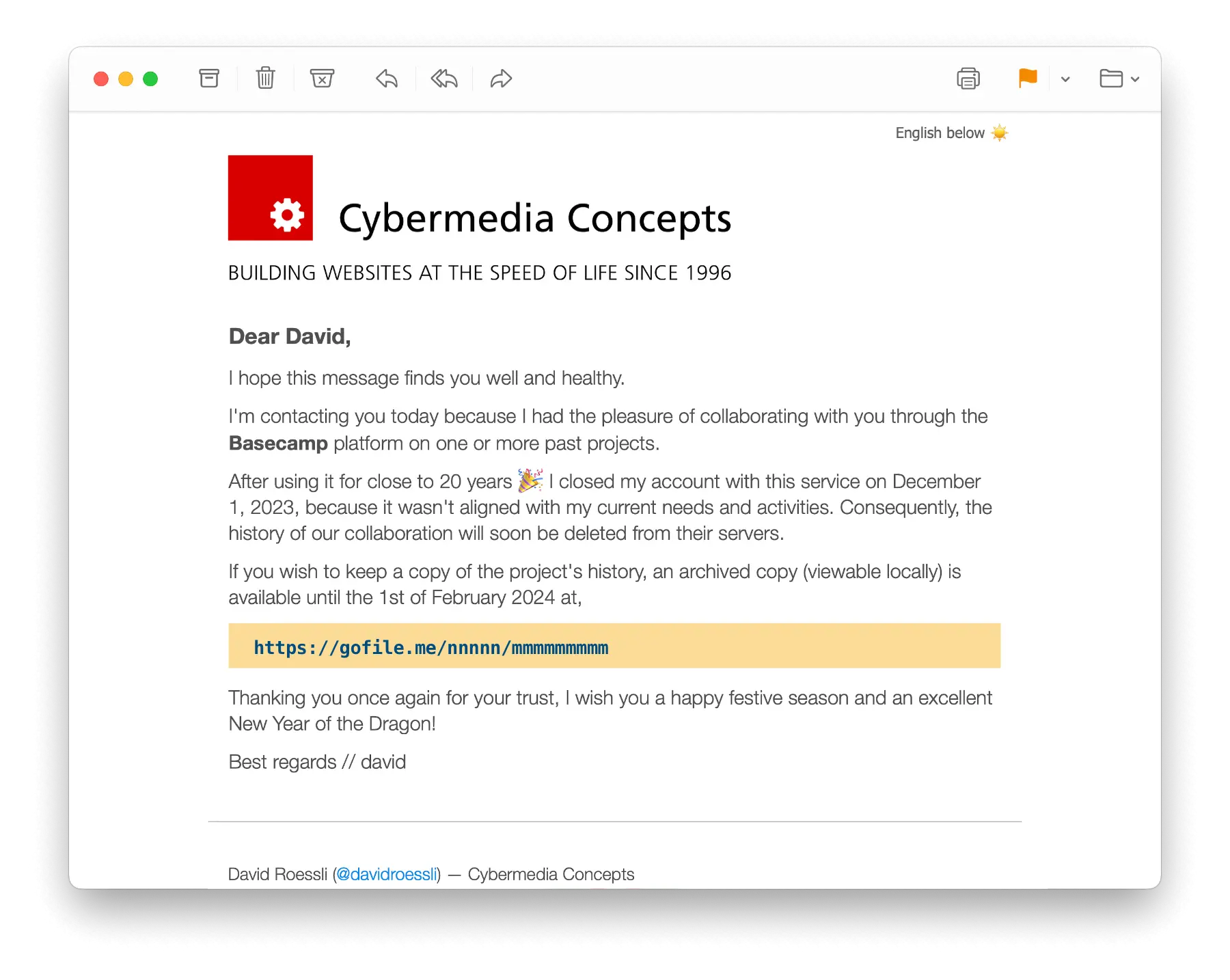The day I closed my Basecamp account
Posted in thoughts
Tags :I closed my Basecamp account today, after having been a customer since April 2004 — that’s almost 20 years ago, give or take a few months.
For those who have never heard of Basecamp, it’s 37signals’ first product, a web-based project management tool built on Ruby on Rails, first used internally and launched in 2004. Its primary features are to-do lists, milestone management, forum-like messaging, file sharing, and time tracking.
We needed a better way to manage projects, track feedback, and make progress. Email, chat, spreadsheets, calls, scattered documents, information here, there, and everywhere just wasn’t cutting it.
— Jason Fried
Like its creators, Basecamp is opinionated. It’s built for a certain type of individual (or team) that want to be efficient and get things done without wasting time looking for stuff all over the place.
Basecamp (Classic)
Basecamp’s first iteration was ground breaking. It was the first tool that matched my needs and empowered me with new ways of collaborating and sharing information online, way before Google Docs or Trello. I feel that today, it still hasn’t been matched.
Closing my account wasn’t a decision I took lightly. Basecamp has been part of my toolbox and workflow since forever. As a freelancer, it was the place new projects saw the light. The place I jotted down ideas, gathered links, and invited clients or partners to collaborate. The place I turned to for the history of a project, from its inception to completion (or termination). It fit my mental model of project management.
Today, my current project index is closing on 700 (granted, I started at 100), and the ‘Everyone’ or ‘All People’ tab lists over 250 contacts.
The product evolved to Basecamp 2 and eventually to Basecamp 4, but that first iteration retains a special place in my heart. Not only did it coincide with the explosion of open APIs, sharing and what was soon to be coined “Web 2.0”, it enabled me to include my clients in the design and development process as real partners. The templates could be customised and translated (which wasn’t possible with later versions). Email discussions were smartly parsed and integrated in the discussion feed (a killer feature). Private discussions between partners were kept out of the client feed, everything was very asynchronous and felt so “ajaxy“. Wild.
Basecamp (2, 3 and 4)
I migrated to Basecamp 2 in 2012, which embraced responsive design and offered a mobile app - but was only in English. I skipped v3 and was offered a free year of Basecamp 4 last December. All of my current projects are all in v2, I never seized the opportunity to use v4.
Today, my project management needs have evolved in such a way, that my current activities don’t warrant a subscription to Basecamp.
Most of my current clients come with their own project management system, and I have fewer opportunities to start new projects since I pivoted my activities post-lockdown. I try to engage into mid to long-term projects, as opposed to short-term single interventions. As a consequence, my remaining Basecamp projects are mostly maintenance and support related and very low bandwidth.
Deep down, I feel sad to gently close that door as it is linked to a special time in my career, when everything was possible and I was met with new challenges daily. I will always have a soft spot for Basecamp (well, except maybe for v3).
Email (still) rules
Keep in mind that email still rules today as a project/document management tool. Number of clients never fully embraced the Basecamp workflow, and I ended up filling in discussion feeds with information I received out of Basecamp more often than I care to admit. Then again, the fact it was only offered in English might have been an obstacle for certain French-speaking users.
Shared history
Basecamp has always provided rock solid ways to export your data, even for the 20-year-old projects (that are still visible online).
Once I had exported my projects, and archived them with their assets and source files, I thought it would be interesting to offer a copy of the more important projects to my former clients and partners.
After checking the nature of private discussion feeds across projects, it turned out that most of them weren’t sensitive in the sense that they had to be kept hidden, so I simply left most of them as is.

I cross-referenced the clients, the projects and the compressed archives and designed a simple newsletter to announce I wasn’t using Basecamp anymore, and offer them to download a copy of the projects they were involved in.
I thought it might be a nice way of getting in touch with people I hadn’t heard of in a while. The reactions were positive, eventhough I’m not sure these archives will be of interest to any of them, but it felt good to reconnect.
Thank you for everything Basecamp ♥︎ #kthxbye
🎶 Currently enjoying “Oh! Sweet Nuthin’” by The Velvet Underground.
Comments and responses
14 Dec 2023
30 Dec 2023
10 Jan 2024
10 Jan 2024
14 Dec 2023
@davidroessli
I used it a lot in the beginning as it hit the sweet spot for my freelance activities but it has become less relevant over time and since I went full time freelance in 2017 I have not used it at all - though I still have a log in. Interesting how much online life has changed in the meantime!